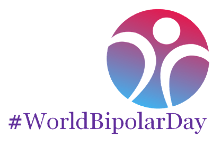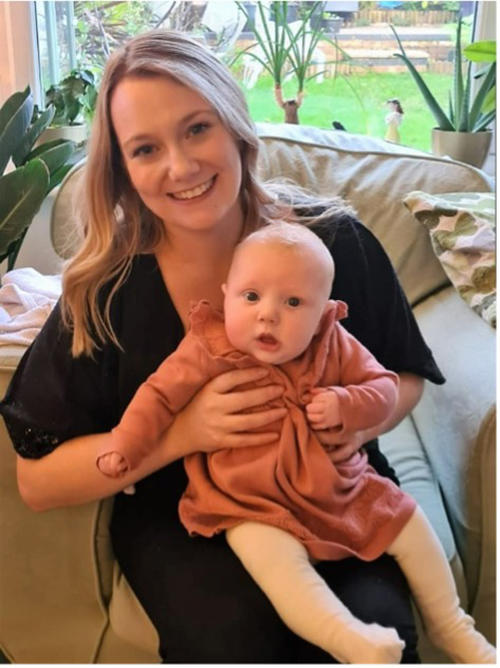To mark World Bipolar Day 2023 on the 30th March,
Dr Amy Perry, Research Associate with the
Mood Disorders Research Group at the University of Worcester highlights the impact of pregnancy and childbirth for women with bipolar disorder.
The prospect of welcoming a new baby into the family and becoming a parent is usually an exciting and special time, yet at the same time can be anxiety provoking and challenging too. For most new parents, typical worries include those about finances, changes to family dynamics and the day-to-day routine of caring for a new baby – I know I certainly shared these concerns when I gave birth to my daughter Ella over a year ago. Yet for some women and their families, childbirth and specifically the few weeks after the baby arrives (known as the postpartum period), poses an altogether different and unique challenge – the risk of a very severe mental health condition called postpartum psychosis.
In contrast to the well known baby blues and postnatal depression, both of which are common in women following childbirth (affecting around 60% and 15% of women respectively), postpartum psychosis is an illness that many people have never heard of. It is rarely discussed in antenatal classes, and evidence shows that even midwives and other healthcare professionals can be unaware of postpartum psychosis.
What is postpartum psychosis?
Postpartum psychosis is a severe mood disorder that starts very suddenly following childbirth, typically within the first two weeks. Symptoms are varied and can change rapidly from hour to hour (or even minute to minute), which is sometimes described as ‘kaleidoscopic’. Typical symptoms that women experience include mania (feeling excessively happy and elated), mood lability (rapid changes in mood from tearfulness to elation, and often being very irritable), extreme confusion, anxiety, delusions (believing things that are not true) and hallucinations (seeing and/or hearing things that are not there).
The sudden onset and severity of these symptoms means that postpartum psychosis is a medical emergency, and in most cases requires hospitalisation and urgent treatment with psychiatric medicines. Most women go into a specialist mother and baby psychiatric unit, so that their new baby can stay with them while they are in hospital. Fortunately, with treatment, most women can recover well from postpartum psychosis, although around half will have further episodes of mood disorder again in the future.
What is the link to bipolar disorder?

While postpartum psychosis is quite rare in the general population (affecting only 1-2 in every 1000 women), women who have bipolar disorder are at strikingly high risk of experiencing postpartum psychosis after having a baby. Our research group (the Bipolar Disorder Research Network) and others, have found that as many as 1 in 5 women with bipolar disorder experiences postpartum psychosis – which means they are many more times at risk compared to women who do not have bipolar disorder, including women who have other severe mental illnesses such as schizophrenia. So it is clear that bipolar disorder and postpartum psychosis are closely related. However, the question of why women with bipolar disorder are so much more likely to experience postpartum psychosis remains. So far, there is some evidence from our research group that points to genetic factors being involved, but also that genetics cannot fully explain the link between the two conditions. So what about aspects of pregnancy that may influence whether or not a woman who has bipolar disorder experiences postpartum psychosis?
Our current research
For a number of years, our research group at the University of Worcester (led by Professor Lisa Jones), has been working to address this very question. As part of my PhD (and ever since), I have had the privilege of being lead Research Associate for the BDRN Prospective Pregnancy Study. This research involves repeated assessments of women who have bipolar disorder and are pregnant, throughout their pregnancy and after delivery until their baby is around three months old. I interview the women at three different time points, and also gather information from their GP and psychiatrist, to measure a wide range of factors, such as, their physical and mental health, their social support and social circumstances, any worries and concerns they may have, and which medications they are taking. So far, more than 130 women with bipolar disorder taken part in the study, which is the largest of its kind in the world.
The results that we have so far are promising, offering useful insights into the potential causes and triggers of postpartum psychosis. For example, we have found evidence that women with particular types of bipolar disorder (called bipolar type I disorder and schizoaffective bipolar disorder) and those who experience episodes of mania during pregnancy are particularly likely to experience postpartum psychosis. We have also found that severe sleep loss during childbirth makes women more likely to have postpartum psychosis.
While we are starting to learn more about this complex and severe illness, there is still much more work to do. Research such as ours is vital to help inform the many difficult choices and decisions that women with bipolar disorder have to make about pregnancy and childbirth, in particular whether or not to continue taking medication when they are pregnant and breastfeeding. We also know that many women who experience postpartum psychosis feel guilt or shame that they or their partner are in some way to blame for their symptoms. All research in this area suggests this is simply not the case, and it is our hope that at least in some small way, our research will help increase awareness and reduce stigma for women and their families affected by postpartum psychosis. Doing so is crucial if we are to detect cases early and ensure the best possible outcomes for women and their families.
Ultimately, we know this goal is only achievable with the kind and generous participation of women in our research who are willing to sharing their very personal experiences of mental illness with us. So to all those who have been involved and continue to support our work, we would like to say a very special thank you – your contribution is invaluable.
 Dr Amy Perry and her daughter, Ella
Dr Amy Perry and her daughter, Ella
To keep up to date with our research, you can follow our research group on Twitter here
Dr Amy Perry and members of the Mood Disorders Research Group teach and supervise research projects about mental illness, including bipolar disorder and postpartum psychosis, on many undergraduate and postgraduate courses at the University of Worcester, including PhD, Psychology BSc (Hons), Medicine MBChB, Midwifery BSc (Hons), Nursing BSc (Hons), Physician Associate MSc, and Paramedic Science (BSc Hons).